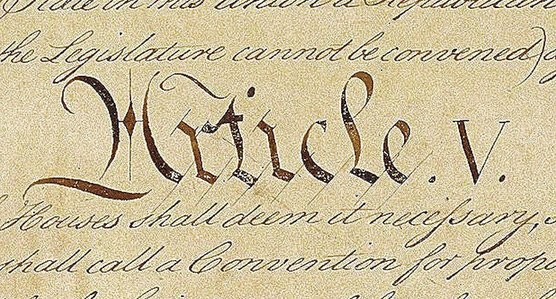Sign Up
Legislation
Stopping a Dangerous Article V Convention

Wealthy donors, corporations, and radical actors are pushing calls for a dangerous Article V Convention that would open the entire U.S. Constitution and Bill of Rights up to revision in a forum that risks being hijacked by wealthy and ideological special interests.
Frighteningly, they are just a few states away from succeeding.
What is an Article V Convention?
Under Article V of the U.S. Constitution, Congress is required to hold a constitutional convention if two-thirds of state legislatures (34 states) call for one. However, there are no rules for an Article V convention outlined in the Constitution. There are no rules about:
- What issues the convention will address. There are no rules limiting the convention to a single issue or preventing an Article V convention from writing an entirely new document, as the 1787 Philadelphia Constitutional Convention did when it created our current Constitution.
- How delegates will be selected. Nothing entitles voters to select their states’ delegates and only one state has a law providing for popular election of delegates to an Article V convention.
- The role of well-funded special interests. There are no rules preventing corporations from pouring money in to influence delegates or the selection of delegates. Lobbying laws, campaign finance laws, and even bribery statutes may not fully apply.
- How decisions will be made. There are no guidelines as to one vote per delegate or one vote per state or some other system. There are also no rules about the number of votes required for passage; it could be a simple majority, two thirds, or some other threshold.
Article V does not give the president, the U.S. Congress or state legislatures any control over a convention, and in Coleman v. Miller (1939) the U.S. Supreme Court ruled that disputes about amending the Constitution are “political questions” into which federal courts may not intervene. Changes proposed by an Article V convention would remain open for ratification by the states indefinitely, potentially obtaining the required number of states after a “wave election.” For example, the 27th Amendment was ratified in 1992, more than two centuries after Congress proposed it in 1789.
This is why leading figures on both the left and right have raised concerns about a runaway Article V convention. Chief Justice Warren E. Burger wrote in 1988 that a “Constitutional Convention today would be a free-for-all for special interest groups, television coverage, and press speculation.” Even Justice Antonin Scalia said in 2014, “I certainly would not want a constitutional convention. I mean whoa. Who knows what would come out of that?”
What are the current efforts to call for an Article V convention?
Right now, there are four major campaigns for an Article V convention:
- Balanced Budget Amendment (BBA) campaign
- Convention of States (COS) campaign
- Term Limits campaign
- Wolf-PAC Anti Citizens’ United campaign
Regardless of opinions on these individual issues, the problem is the same: an Article V convention would open the U.S. Constitution up to revision in a forum that risks being hijacked by powerful partisan, ideological, and wealthy special interests in ways that threaten and could roll back our hard-won freedoms.
The campaign closest to meeting the 34-state threshold is the Balanced Budget Amendment (BBA) campaign with 28 states and backing from wealthy special interests. The second closest is the Convention of States (COS) campaign with 19 states.
If these campaigns are successful, this would be the first constitutional convention since the original convention in 1787—all constitutional amendments since then have been passed first by Congress and then approved by three-fourths of the state legislatures.
Where does Florida stand?
Florida previously passed calls for an Article V convention as part of the Balanced Budget campaign (2010 and 2014), Convention of States campaign (2014), and Term Limits campaign (2016).
In 2014, Florida also created the Article V Constitutional Convention Act (11.93-11.9352 F.S.), which outlines the appointment of delegates by the Florida Legislature, how the delegates will be instructed, and the creation of an advisory group to oversee the delegates. These statutes provide some guardrails for Florida delegates but may be changed by the Florida Legislature at any time. These statutes also have no impact on the selection or oversight of delegates by other states.
In the 2024 legislative session, Florida again passed calls for an Article V Convention as part of the Balanced Budget and Term Limits campaigns, and added calls for a convention for Equal Application of the Law and Line-item Veto.
These bills re-up Florida’s already existing call for a dangerous Article V Convention, but thankfully do not add a new state towards the 34-state threshold.
What can we do?
Recognizing the risks, multiple states have rescinded their prior applications for an Article V convention in recent years, including Colorado and New Jersey in 2021, Illinois in 2022, and Oregon in 2023. Florida legislators who want to protect the Constitution and Bill of Rights from the dangers of an Article V convention can REJECT bills calling for a convention and file new legislation to RECIND Florida’s past applications for a constitutional convention.
Your financial support helps us make an impact by holding power accountable and strengthening democracy.
Our Experts

Viki Harrison
Director of Constitutional Convention and Protect Dissent Programs
